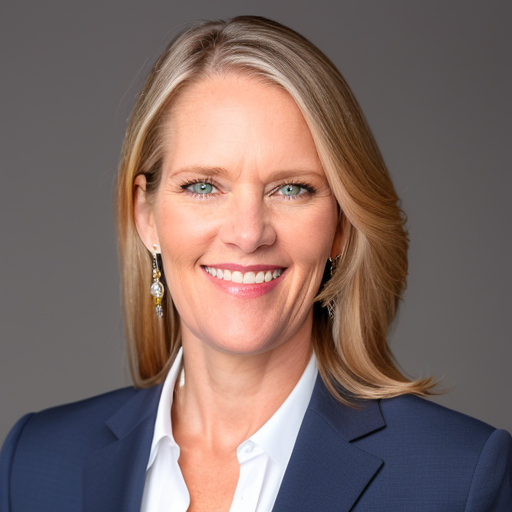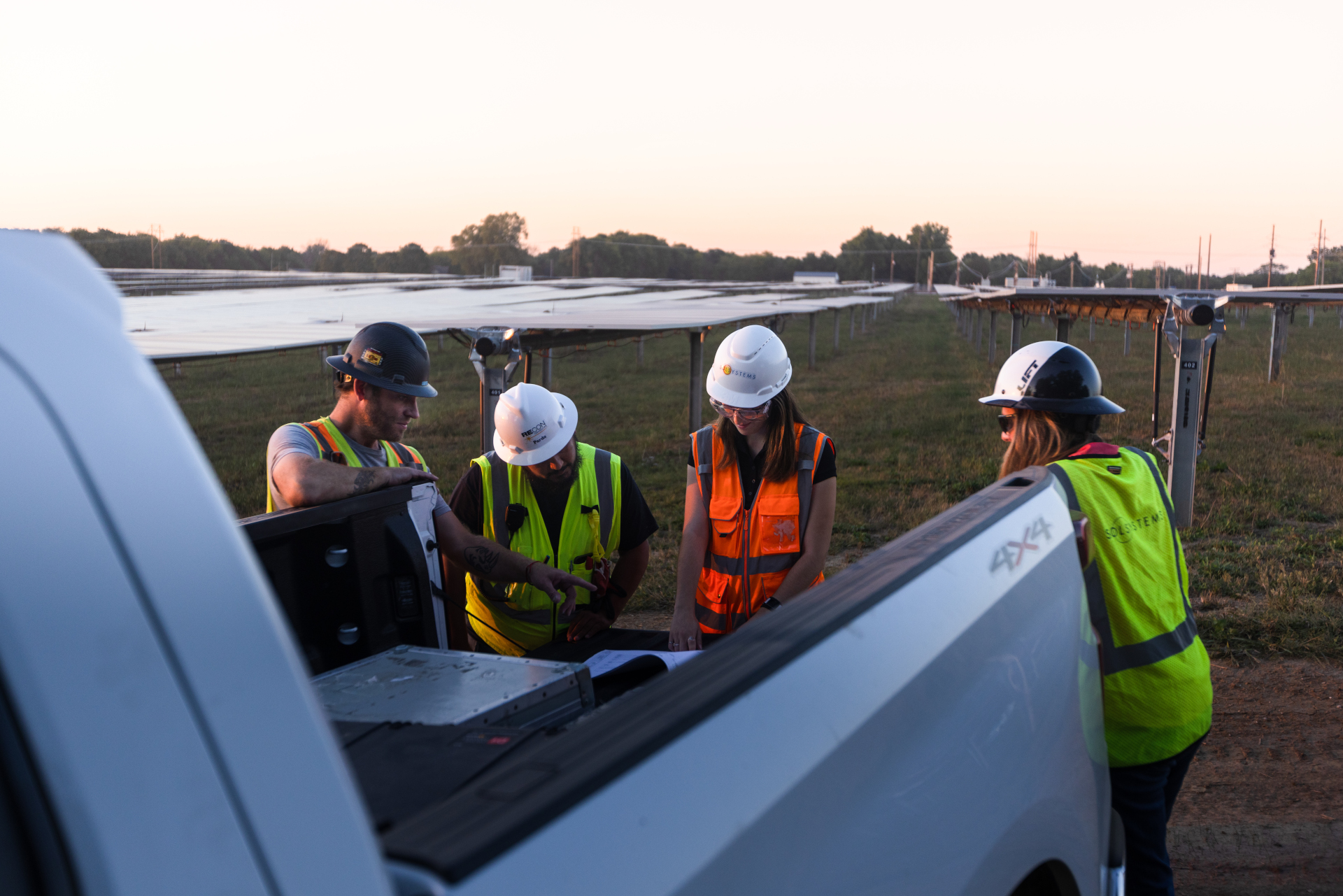Rebecca Halford is Sol Systems’ Senior Director, Community Engagement where she leads teams to develop community engagement strategies for renewable energy projects and ensures inclusive stakeholder participation. With over a decade of experience in renewable energy and climate strategy, Rebecca's career includes senior roles at AES Corporation where she led stakeholder relations in the WECC region, and at Clean Energy Collective where she managed education and engagement for community solar projects.
I hope you enjoy learning how engaging communities on infrastructure projects fosters trust through consultation and communication, influencing their success and sustainability.
-Adaora Ifebigh
____________________________________________________________________________

How did you begin your career in renewable energy, and what do you find most rewarding about this work? What motivates you in your role as Senior Director for Community Engagement?
Before getting into solar energy, I owned a small real estate brokerage in Albuquerque, NM that specialized in land development. I had a small team, and the market was robust. However, with the onset of the Great Recession, the financial landscape shifted dramatically; banks halted lending, and my business struggled. Despite the economic downturn and numerous business closures, I noticed solar was taking off. As people began to seek energy independence and take advantage of tax incentives, I discovered an opportunity that enabled me to present to small groups like real estate brokers, teaching them about the value of rooftop solar, and showing them how they could access solar energy incentives for their homes. From this role, I transitioned to community solar and then into utility-scale solar development.
My motivation has always been rooted in the desire to share the benefits of solar energy and educate communities about the advantages of transitioning to clean energy. A former colleague used to say, “This is homegrown energy,” highlighting the local pride associated with creating energy from within communities. I am passionate about forming connections, conveying the positive impacts of solar projects, and nurturing relationships to become a trusted partner in the process.
One of the most rewarding aspects of my role is celebrating the completion of a project. These projects require extensive time and effort, from introducing project ideas to the community and developing plans for local benefits, to realizing the impact through community programs. Knowing that our team has contributed to long-term positive change through our programs is incredibly fulfilling.
Sol Systems is a renewable energy firm dedicated to accelerating America's clean energy future and investing in local communities. What role does community engagement play at Sol Systems, and how does the community engagement team collaborate with other teams to ensure the successful development and construction of solar projects in local communities?
The Community Engagement Team plays a key role within Sol Systems, working with almost all the teams at Sol from the earliest stages of project development. Our development teams rely on us to assess opportunities and identify partnerships in the communities where we intend to develop or purchase early-stage projects. We keep track of our projects to understand the community feedback around a new infrastructure project. We work with the policy team to understand regulatory frameworks that impact solar development. Our partnership with the construction team ensures that the community's experience with the project is well-managed, addressing questions and concerns and keeping residents informed about construction timelines. Whether it’s the social and economic benefits, or during construction when it can be a little bit stressful or disruptive for a short period of time within a community, we represent the community and ensure that our teams hear their voice as we go through the different phases of a project.
The Sol Systems’ Impact Team is a valuable and unique partner as we establish relationships with communities at the beginning of a project. We provide a bird’s eye view of the community needs that could translate into future economic benefits for the community once the solar projects are operational. The community engagement team’s earliest efforts shape our relationships and the impact-driven initiatives that we establish post-construction.
Some communities are passing laws to ban new renewable energy projects, while others are enacting laws to prevent local governments from doing so. How is your team navigating these challenges and working with communities to advance the clean energy transition? How do you address concerns or resistance to clean energy projects within these communities?
Engaging with communities allows the developer to understand the community’s philosophy and interest in large scale infrastructure projects. This engagement highlights the various roles within the community and how the local government is structured. By meeting people where they are—whether at townhalls, community fairs, or school meetings—we gain insight into what matters to the community and explore possibilities for collaboration.
I don't view moratoriums and ordinances for renewable energy projects as roadblocks. Instead, moratoriums can provide small governments with the opportunity to establish guidelines that ensure projects meet community needs. Outright bans on infrastructure projects can be complex, but we remain hopeful that our team can meet with the community leaders, build relationships and try to have conversations about infrastructure projects respectfully. Successful solar projects and the economic benefits that come from such projects in neighboring communities may help to lessen concerns from communities that are debating whether to pass an ordinance against solar projects or not.
Ultimately, our goal is to show communities that we support their self-determination and aim to be a long-term, reliable partner.
How do you build and maintain strong relationships with the communities where Sol Systems’ projects are located? What are the benefits of these partnerships in addressing challenges facing both the industry and these communities? What challenges have you encountered in fostering these partnerships, and how have you overcome them?
Building strong relationships begins with understanding the community's values and priorities. For example, on a recent trip to Kentucky, I met with community members and local government officials to learn about their community values—agricultural programs, education, and energy mix to name a few. Rather than imposing an agenda, we work with community contacts to identify and support initiatives that align with local values. These early connections are crucial, and their impact endures beyond project completion. Communities recognize that we listened to their needs and delivered on our commitments, which fosters trust and long-term collaboration. Once the project is complete, those early connections prevail.
We recognize there can be some opposition to renewable energy projects in any community, particularly when driven by misinformation. As we build partnerships and become a trusted advisor in the community, we want to provide them with the education needed to counter the misinformation. Our role is to empower communities with facts and build lasting trust.
With economic concerns being top of mind for many Americans, are there any policy changes or industry trends influencing your team’s community engagement approach? Do any of these give you confidence that authentic engagement can lead to economic development and land stewardship, addressing community concerns about utility-scale projects while ensuring benefits for all and leaving no communities behind?
The energy communities’ provision in the Inflation Reduction Act (IRA) is a tremendous opportunity to maximize the project impacts. Since the legislation passed two years ago, we have worked to leverage its benefits in our communities. Understanding the intricacies of the IRA and engaging in open dialogue with local officials allows us to maximize community benefits. On a recent trip to Champaign, IL, the Economic Development Director, expressed interest in funding to build out transmission in the state which would create new jobs and economic benefits for the community. Our Infrastructure + Impact approach ensures that solar projects benefit communities that are disproportionately affected by climate change. This includes initiatives related to the importance of diligent land stewardship, pollinator-friendly solar certifications, and research into the benefits of native perennial vegetation around solar project sites. Recently, Sol Systems executed an agreement with American Farmland Trust (AFT) that focuses on Smart SolarSM initiatives. Smart SolarSM, a concept service created by AFT, outlines principles to minimize the environmental impacts of solar developments while enhancing ecosystem-focused practices at solar sites. Over 2,000 acres of land from the projects that Sol Systems will develop in the next four years will participate in a research partnership with AFT to test soil health and assess the impact of beneficial vegetation.
The mission of the IRA, the growing momentum in the renewable energy sector and the interest in building deep community partnerships gives me confidence that while economic concerns remain top of mind and should be important to many Americans, we have the tools to build a clean energy economy that works for everyone.
Whether it's Illinois or Louisiana or anywhere else, we prioritize these types of partnerships and want to make sure that we return the land in the best condition possible. The IRA, the renewable energy sector's momentum, and our commitment to deep community partnerships instill confidence that we can build a clean energy economy that benefits everyone while addressing economic concerns.
Is there anything important we haven't discussed that you'd like to share with us?
Reflecting on the industry since I joined in 2010, I am continually inspired by the rapid evolution and growth in community engagement practices. Over the past decade, community engagement has become a priority with most development firms and seeing that evolution has been rewarding. We strive to build great projects and strong relationships, which help mitigate community opposition or navigate regulatory challenges.
We also aim to collaborate effectively with communities, ensuring that our efforts are valued and that we respect and integrate their values. At Sol, the emphasis on community engagement is evident in how our team’s contributions are appreciated across the company. This affirmation of our work demonstrates Sol Systems’ commitment to building meaningful relationships and identifying pathways for progress.



